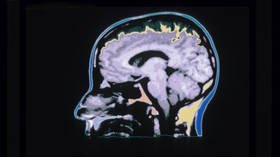Anxiety twinned with depression causes sufferers’ brains to swell ‘significantly’

The brains of people suffering from the twin scourges of anxiety and depression have been found to swell dramatically. Experts say the extraordinary activity may mask part of the damage depression can cause.
Researchers, investigating the effects of depression and anxiety on the volume of people’s brains, have made the discovery that depression by itself causes the brain to shrink. However, when paired with anxiety, as is often the case, the disorder causes one area of the brain to become “significantly” larger.
Interestingly, two different areas of the brain are affected by the problems. The scientists found that people who have depression alone have lower brain volumes in many areas of the brain, with the hippocampus, the part of the brain linked to memory and learning, particularly affected.
Experts say that’s even more relevant later in life, because a smaller hippocampus is a risk factor for Alzheimer’s disease, and may accelerate the development of dementia.
Also on rt.com Turns out ‘love-hormone’ Oxytocin may be secret weapon against Alzheimer'sHowever, when depression and anxiety occur together, it causes an increase in the size of the amygdala, the part of the brain linked to emotions, and people who had both depression and anxiety had less shrinkage in many other brain areas.
The researchers say this indicates that the true effect of depression on the brain has been underestimated because of the opposite effect in the amygdala.
“Anxiety lowers the effect of depression on brain volume sizes by three percent on average, somewhat hiding the true shrinking effects of depression,” explained lead researcher Daniela Espinoza Oyarce of the Australian National University.
“More research is needed into how anxiety lowers the effects of depression, but, for the amygdala, perhaps anxiety leads to overactivity,” she added.
The study was published in the Journal of Psychiatry and Neuroscience, and included more than 10,000 participants.
Also on rt.com Boost in battle against drug-resistant parasites, as roundworms’ ability to survive without oxygen revealedLike this story? Share it with a friend!














